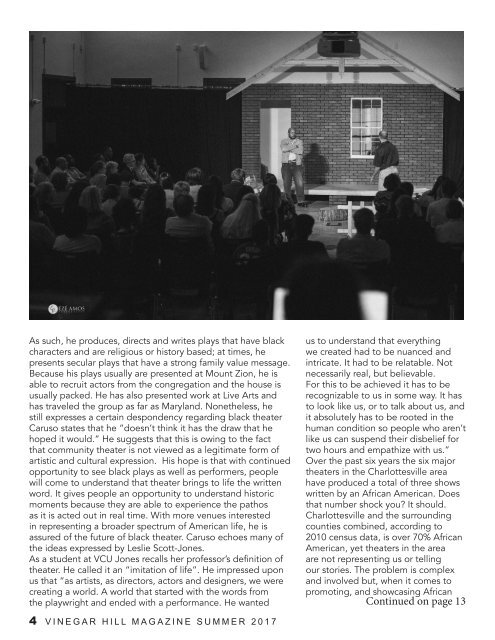Vinegar Hill Magazine
You also want an ePaper? Increase the reach of your titles
YUMPU automatically turns print PDFs into web optimized ePapers that Google loves.
As such, he produces, directs and writes plays that have black<br />
characters and are religious or history based; at times, he<br />
presents secular plays that have a strong family value message.<br />
Because his plays usually are presented at Mount Zion, he is<br />
able to recruit actors from the congregation and the house is<br />
usually packed. He has also presented work at Live Arts and<br />
has traveled the group as far as Maryland. Nonetheless, he<br />
still expresses a certain despondency regarding black theater<br />
Caruso states that he “doesn’t think it has the draw that he<br />
hoped it would.” He suggests that this is owing to the fact<br />
that community theater is not viewed as a legitimate form of<br />
artistic and cultural expression. His hope is that with continued<br />
opportunity to see black plays as well as performers, people<br />
will come to understand that theater brings to life the written<br />
word. It gives people an opportunity to understand historic<br />
moments because they are able to experience the pathos<br />
as it is acted out in real time. With more venues interested<br />
in representing a broader spectrum of American life, he is<br />
assured of the future of black theater. Caruso echoes many of<br />
the ideas expressed by Leslie Scott-Jones.<br />
As a student at VCU Jones recalls her professor’s definition of<br />
theater. He called it an “imitation of life”. He impressed upon<br />
us that “as artists, as directors, actors and designers, we were<br />
creating a world. A world that started with the words from<br />
the playwright and ended with a performance. He wanted<br />
us to understand that everything<br />
we created had to be nuanced and<br />
intricate. It had to be relatable. Not<br />
necessarily real, but believable.<br />
For this to be achieved it has to be<br />
recognizable to us in some way. It has<br />
to look like us, or to talk about us, and<br />
it absolutely has to be rooted in the<br />
human condition so people who aren’t<br />
like us can suspend their disbelief for<br />
two hours and empathize with us.”<br />
Over the past six years the six major<br />
theaters in the Charlottesville area<br />
have produced a total of three shows<br />
written by an African American. Does<br />
that number shock you? It should.<br />
Charlottesville and the surrounding<br />
counties combined, according to<br />
2010 census data, is over 70% African<br />
American, yet theaters in the area<br />
are not representing us or telling<br />
our stories. The problem is complex<br />
and involved but, when it comes to<br />
promoting, and showcasing African<br />
Continued on page 13<br />
4 VINEGAR HILL MAGAZINE SUMMER 2017


